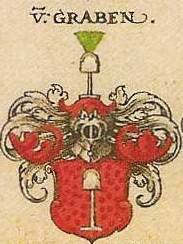Friedrich II von Graben
This article needs additional citations for verification. (January 2013) |

Frederick II von Graben (died before 1463), also called Frederick the Younger (German: Friedrich der Jüngere), was a Styrian noble, a member of the edelfrei Graben von Stein family. He held the titles as Lord of Kornberg and Marburg, the , (in Lower Styria), as well as burgrave of Riegersburg. [1] One of the most affluent Styrian nobles, Frederick was an advisor to the Habsburg emperor Frederick III, assessor at the Reichskammergericht, and member of the duchy's Landtag assembly.
Life[]
Frederick's ancestors were of the Styrian branch of the Graben von Stein family, which sprang out from the princely Meinhardiner dynasty; his parents were Frederick I von Graben (died c. 1422 at Kornberg Castle), progenitor of the Kornberg line, and Katharina von Summeregk (Sommeregg). Frederick II succeeded his father in Styria, while his brother Andreas von Graben (d. 1463) inherited the Carinthian (Ortenburg) estates of their mother.
In 1438 Frederick II married Elisabeth Steinwald von Fladnitz. Their son Ulrich III von Graben (d. 1486), a loyal follower of Emperor Frederick III like his father, was appointed Landeshauptmann governor of the Styrian duchy in 1462.
Frederick first appeared in a 1401 deed, when he received the burgraviate of Riegersburg serving the Walsee noble dynasty from Swabia. He soon acquired further estates from Seckau Abbey and, since 1443, owned the villages of Neudorf and Pölan as well as parts of the villages Altendorf near Wolfsberg in Carinthia and Wanofezen. From 1446 he is documented as a member of the Styrian estates (Landstände) and in 1456 received, together with his son Ulrich III, the pawned the with Obermarburg and Maribor Castle from the Walsee owners. In 1461 he signed a contract in which Laibach (Ljubljana) in Carniola became the see of a diocese.
Notes[]
Literature[]
- Johann Weichard Freiherr von Valvasor (1689): Die Ehre dess Hertzogthums Crain: das ist, Wahre, gründliche, und recht eigendliche Belegen- und Beschaffenheit dieses Römisch-Keyserlichen herrlichen Erblandes; Laybach (Ljubljana)
- People from Styria
- Medieval Austrian nobility
- Medieval Austrian knights
- 15th-century Austrian people